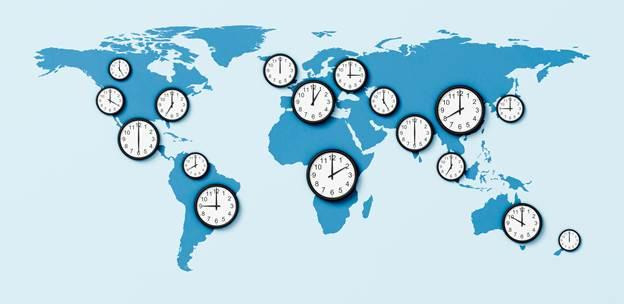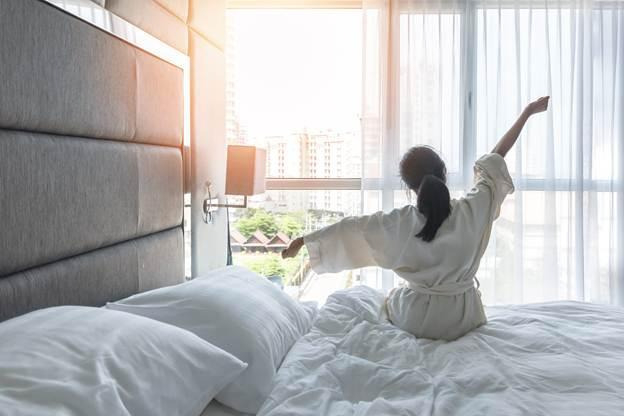The world is divided into 24 standard time zones, coinciding with the speed of the Earth’s rotation. When accounting for Daylight Saving Time (DST), variations in the standard time zone borders, and local time, the figure increases to 38. Some large countries like China and India even use only one time zone, despite their size dictating having several. [1]
While putting the world under one time zone may seem nice, it poses several problems. Day-night cycles are still a thing, and working at night or sleeping during the day can risk throwing off the body’s circadian rhythm. Also, the concept of “AM” and “PM” would be rendered moot because it’ll only be one time all over the world.
That said, having multiple time zones has its fair share of problems. It can also throw one’s sleep-wake cycle out of sync, as it struggles to adapt to a vastly different time. While often in the form of jet lag, the rise of remote work these past few years has also impacted one’s ability to get quality sleep hygiene.
Once a Niche Topic
Studies on the relationship between remote work and sleep disorders surged following the end of the COVID-19 emergency. Researchers in these studies cited that relevant literature on this area was scarce at best before the pandemic.
In 2023, researchers in South Korea studied roughly 5,000 wage workers divided into two groups: remote and office (the latter having five times as many people). They discovered that the remote group was more prone to types of insomnia than the office group. These include having difficulty getting to sleep, staying asleep, and waking up unrested. [2]
In 2024, a sleep study of over 550 remote workers in France revealed that getting frequent work-related calls and emails outside of work hours was a major contributor to insomnia and other sleep problems. It’s also linked to increased work-family conflict, wherein the individual faces conflicting demands from their employer and immediate family. [3]
The main issue is staying in touch beyond a person’s work schedule. Prithwiraj Choudhury, Lumry Family Associate Professor at Harvard Business School, states that remote workers are pressured to shift work schedules toward after-hours. This affects certain people, such as housewives and residents of countries that mandate limiting working hours. [4]
Improving Sleep Quality
These sleep studies above urge employers to create and implement policies that benefit remote employees’ work schedules. However, other experts add that remote workers can take steps on their own, namely, improving sleep quality.
A good start would be to buy a bed frame that suits your space, especially when your old one is making disturbing noises. Consider factors such as the users, size of the mattress and bedroom, available storage space, and maintenance. Spending a bit more on one is a small price to pay for waking up refreshed in a great sleep environment.
A good mattress and set of pillows are just as essential. Apart from matching the size with the bed frame, these items should be ideal for your sleep habits. The market sells at least three kinds of mattresses for enhancing sleep quality.
- Innerspring: A set of metal springs or coils supports the sleeper’s weight. Cavities in between the springs are kept hollow, allowing the mattress to breathe.
- Memory foam: This mattress is filled with memory foam, which is known for returning to its original shape. Experts say this is suitable for people with back pain.
- Hybrid: This mattress combines the best of both worlds, using springs and memory foam in varying proportions (depending on the brand).
In the case of pillows, the market offers far more options. Fillings vary from organic ones like buckwheat to synthetics like memory foam and polyester fiberfill. Aside from sleep routines, the presence of allergies will also be a factor.
Good Bedtime Routines
Sometimes, an erratic work schedule can be unavoidable. Nevertheless, researchers from the Army Medical University in China confirmed the dangers of sleep deprivation to one's immune system and mental health.
In their study of over 88,000 adults wearing accelerometers, they recorded 172 associated diseases following a 6.8-year period. Of these, diseases with a doubled risk are age-related physical debility, gangrene, and liver cirrhosis and fibrosis. Others attributable to sleep deprivation include Parkinson’s disease, type 2 diabetes, and acute kidney failure. [5]
The U.S. National Sleep Foundation recommends that adults get between seven and nine hours of nighttime sleep every 24 hours. Sleep experts in Cleveland Clinic also said that, contrary to popular belief, there’s no ideal time to go to bed. However, an individual needs to be consistent with their bedtime to maintain their circadian rhythm. [6]
Sleep consistency also applies to other aspects of daily life like dinnertime. It’s generally advised to avoid consuming food and drink two to three hours before bedtime, as higher insulin resistance in the evening prompts the body to store these calories as fat. However, if you must have something, dietitians say you can’t go wrong with fruits and vegetables.
Blue light from electronic devices such as smartphones and tablets is known to negatively impact sleep cycles by stemming melatonin levels. Setting the devices to dim their screens when not in use can help prevent this. Also, it’s advisable to refrain from using devices an hour before going to sleep.
Conclusion
The advent of remote work has been a boon to the post-pandemic world, but it also comes with its share of problems. Remote workers struggle to adapt their circadian rhythms to night shifts and other non-ideal shift work times, leading to immune health and mental health disorders. A proper sleep sanctuary will become more important moving forward.
References
- Timeanddate.com. “How Many Time Zones Are There?” 2019. Available from: https://www.timeanddate.com/time/current-number-time-zones.html
- Lee L, Nam OH, Lee KE, Lee C. “Relationship between insomnia and working from home among Korean domestic workers: Results from the 5th Korean Working Condition Survey.” BMC Public Health. July 17, 2023; 23(1). Available from: https://bmcpublichealth.biomedcentral.com/articles/10.1186/s12889-023-16268-5
- Dolce V, Ghislieri C, Molino M, Vayre É. “‘A good night’s sleep!’ How do remote workers juggle work and family during lockdown? Some answers from a French mixed-methods study.” Current Psychology. June 8, 2024; 43(30):24915–29. Available from: https://link.springer.com/article/10.1007/s12144-024-06193-0
- Blanding M. “Global Talent, Local Obstacles: Why Time Zones Matter in Remote Work.” Harvard Business School. 2024. Available from: https://www.library.hbs.edu/working-knowledge/global-talent-local-obstacles-why-time-zones-matter-in-remote-work
- Wang Y, Wen Q, Luo S, Tang L, Zhan S, Cao J, et al. “Phenome-wide analysis of diseases in relation to objectively measured sleep traits and comparison with subjective sleep traits in 88,461 adults.” Health Data Science. January 2025; 5. Available from: https://spj.science.org/doi/10.34133/hds.0161
- The Best Time To Go to Sleep [Internet]. Cleveland Clinic. 2022. Available from: https://health.clevelandclinic.org/what-time-should-i-go-to-bed
About Ecosa
Founded in 2015, Ecosa is a leading Australian sleep solutions brand dedicated to helping people achieve better sleep through innovative, high-quality products. Known for its award-winning mattresses, pillows, and bedding, Ecosa combines comfort, support, and sustainability across its product range. With operations across Australia, New Zealand, Hong Kong, the US, and Canada, Ecosa continues to set new standards in sleep technology while championing environmentally responsible practices. For more information, visit www.ecosa.com.au.
Media Contact
Rob Beer
partnerships@ecosa.com



